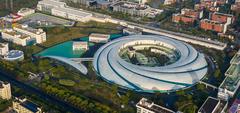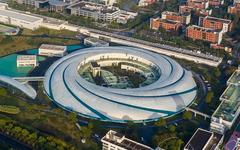URL: https://www.desy.de/news/news_search/index_eng.html
Breadcrumb Navigation
DESY News: Science cooperation with China
News
News from the DESY research centre
Science cooperation with China
A new research project is to draw up guidelines for scientific cooperation with China, thereby providing some much-needed assistance. The WIKOOP-INFRA project, funded by the German Federal Ministry of Education and Research (BMBF), focuses particularly on cooperating at so-called large research infrastructures, such as complex particle accelerators and modern X-ray, laser and neutron sources in China and Europe. The joint project, which is being undertaken by DESY and the German Institute for Global and Area Studies, GIGA, started work in September and is scheduled to run for two years.

However, current global challenges such as the coronavirus pandemic and climate change demonstrate that, despite these difficulties, scientific cooperation with China is more important than ever for Germany and many EU countries. “It is in our interest to consolidate and further expand our cooperation with China. Of course, we must not ignore the controversial and security-relevant aspects of the cooperation,” says Sandhop. So far, however, no systematic guidance has been available to scientists and research institutions when assessing opportunities for cooperation, nor have there been recommendations as to how to deal with the aforementioned sensitive issues.
The WIKOOP-INFRA project (Ensuring safe, transparent and mutually beneficial collaboration with China at analytical research infrastructures) will therefore develop evidence-based guidelines to provide international protagonists, especially from Germany and the EU, with greater orientation and certainty on how to act in the face of sensitive issues when cooperating with China in research using large-scale facilities. For this purpose, interviews and specialist workshops will be held with those in charge, and with researchers and experts from the German, European and Chinese scientific communities.
DESY is collaborating with GIGA, a Hamburg-based social science research institute within the Leibniz Association which conducts research into political, social and economic developments in Africa, Asia, Latin America and the Middle East. The Institute of Asian Studies, one of GIGA’s four subsidiary institutes, has been looking into the rise of China as a research and science nation for many years, and comparing the Chinese and Western innovation systems as an important topic of research. In addition, the project will benefit from the support of the Helmholtz Association with its branch office in Beijing as well as from the cooperation with the Institute for Peace Research and Security Policy at the University of Hamburg, whose research focuses on issues of peace and security policy. “We are very pleased that two proven experts in their respective fields are participating in WIKOOP-INFRA, in the shape of Margot Schüller from GIGA and Götz Neuneck from the IFSH,” says DESY project coordinator Marcus Conlé.




